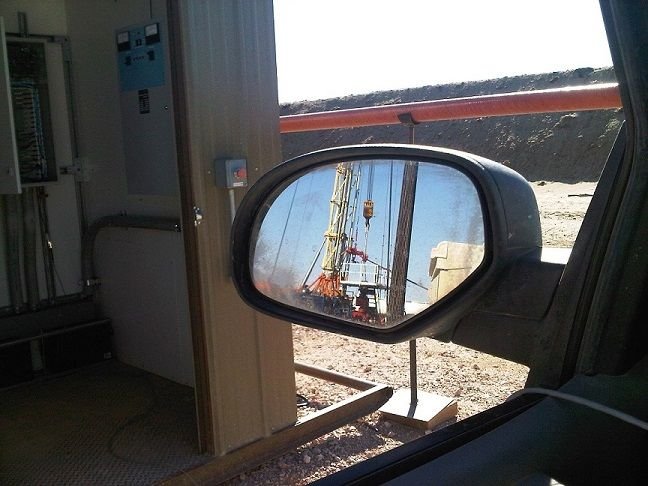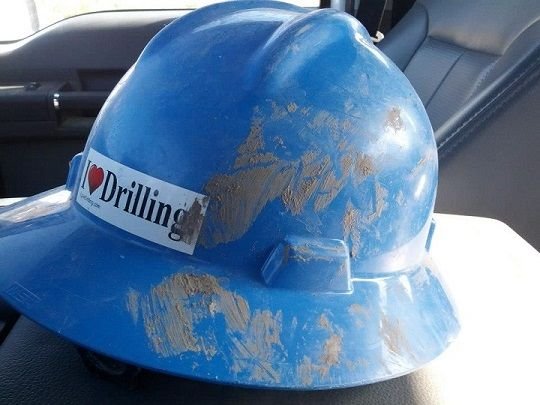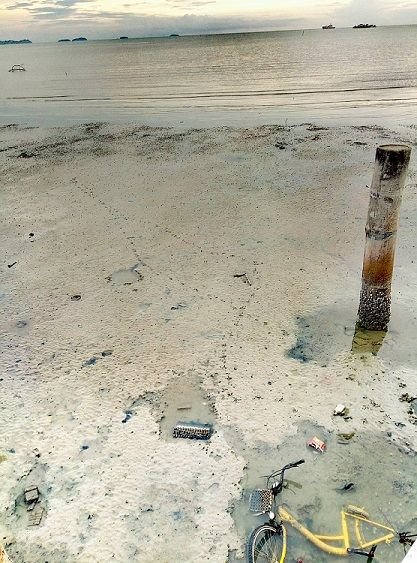As someone who used to work in the oil and gas industry, I get a lot of interesting responses from people I meet when they find out about my past career. The second most common assumption I get is that I left the oilfield because I had some sort of epiphany about how evil the industry is.

Programming the control system for an oil well in Wyoming
I’m not about to defend the oil and gas industry. Yes, some oil and gas firms have engaged in attempts to mislead the public on climate science, which is obviously bad; but the industry as a whole is no more corrupt or prone to buying politicians than any other major industry. What I do want to talk about here in this post is my own analysis of what informs some peoples' assumptions about my motivations for leaving the oilfield and, more importantly, make the argument that I am still just as complicit in the destabilization of the climate now as I was when my paycheques were issued by oil companies.

A warm day in North Dakota
Let’s deconstruct the sentiments behind the epiphany assumption. It basically goes something like this: Only bad people, those who either don’t agree with climate science or who simply don’t care about its validity, work in the oil and gas industry. It follows, then, that someone like me who leaves that line of work possibly did so because of a guilty conscience.
Leaving the obvious aside, there is a deeper statement at work here that I want to focus on. Most people I meet generally tend to like me (or, at least, that’s my impression). They think I’m a nice person and, therefore, as a nice person they assume (and often plainly state) that I left the oilfield because I agree with the logic of the epiphany assumption: Once I became conscious of the fact that I was participating in bad stuff, I chose to leave. The assertion here is that I was a bad person for working in the oilfield, but now I am good because I no longer actively contribute to the destruction of the climate and environment.

Sunrise in Colorado
But what really changed? At this point, I am still an enthusiastic consumer of all sorts of products derived directly from the extraction of fossil fuels (jet fuel being probably the most notable of them). In addition, the thing that nearly everyone forgets is how the economy of the entire world literally operates on fossil fuels. Truck drivers in the US are often quick to point out that, “If you bought it, a truck brought it.” In other words, there is nothing you or I purchase or consume that wasn’t at least delivered by a truck powered by diesel. Also, we often use some form of transportation requiring fossil fuels to go purchase that product. But realizing the role that the oil and gas industry plays in transporting a good to market and in transporting consumers to the goods is just the surface of the problem: One must consider all the links in the supply chain from producer to consumer and how the raw materials, production processes, and transportation methods at each step are soaked in oil, just to gain an appreciation for the true carbon footprint of any consumer good.

The Strait of Malacca
I’ve spent a bit of time this year walking along the oil-soaked coastlines of cities in Indonesia and Malaysia. The waters of any port city here are polluted from oil that inevitably leaks from shipping traffic. Now, some people might quickly blame the oil and gas industry for that mess. However, in the case of pollution like that pictured above, the industry isn’t even directly responsible: it’s shipping companies and their leaky boats that are to blame (an oversimplification, but you get the point). And let's not forget that the shipping industry is responsible for double the CO2 emissions of the aviation industry. So, in a world where many, many products are made in China, we could probably amend the truckers’ adage above to: “If you bought it, a ship brought it and then a truck brought it.” All of us, as consumers, are at the pinnacle of a very deep and complicated chain of fossil fuel consumption--and all of that is without considering the ecological damage inflicted by the extraction of raw materials used to make the goods being shipped or the often harmful effects of certain production and manufacturing processes.
So, I’m clearly not such a nice guy, after all…and neither are you. The epiphany assumption makes the unspoken assertion that all of us who don’t work for an oil company are somehow more righteous in that we are more aware of our impact on the environment and climate, and are (supposedly) making more of an effort to reduce that impact. But that’s not true. I doubt there is anyone reading this who would actually make the sacrifices necessary to reduce their carbon footprint to a sustainable level.
I’m not trying to shift blame from the oil and gas industry to consumers. That’s an equally facile argument. Rather, instead of pushing for incremental changes that look eco-friendly on the surface, we should be talking about revolutionizing the (sometimes) hidden environmental impact of even the most well-intentioned products. There are structural issues to confront here concerning how goods are produced and transported that is completely absent from discourse on reducing one’s carbon footprint. While I won’t dispute that reducing individual consumption and refusing to purchase certain products might make some sort of impact within the marketplace (the supposed power of consumers being an article of faith of global capitalism), consumer action alone cannot bring about the vast structural changes that are required to really make a difference. It might make us all feel good to cast someone as the bad guy, but we need to look beneath the surface and confront these ugly truths if anyone wants to work toward creating actual change. If, on the other hand, all you want to do is wear your anti-oil badge on your sleeve by pretending that using canvas grocery bags or removing oil companies from your investment portfolio will change the world, I don’t want this blog post to be the cause of any lost sleep.
